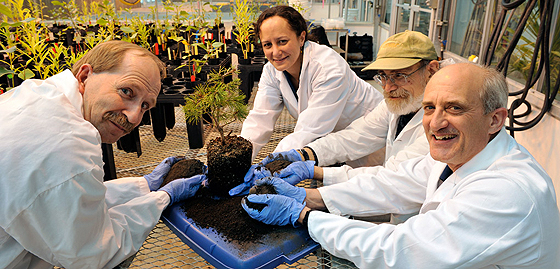Getting the Dirt on Fertilizers
Saturday, August 24, 2013 @ 3:47 AM

l-r UNBC Professor Hugues Massicotte, student Nichola Gilbert, Research Assistant Scott Brown, and Professor Mike Rutherford display some ash-enhanced soil – photo courtesy UNBC
Prince George, B.C. – So you want to know what makes the best fertilizer? Researchers at UNBC are working on that.
They have completed a study which shows combining bio solids from cities, and ash waste from bio- energy plants results in a great fertilizer. Depending on the soil conditions, the plant growth can be boosted by as much as 200%.
The project used ash from the University’s award-winning bioenergy plant, local industries, and locally-sourced biosolids.
For four months, willow and poplar cuttings were grown in two soils: one from a copper-molybdenum mine site (Gibraltar Mine north of Williams Lake), and one from a bioenergy plantation (Pacific Regeneration Technologies) near Prince George. Overall, wood ash combined with biosolids proved the most fertile.
“With industry and communities already operating bioenergy plants – or planning to implement them – this research illustrates potential uses for the ash that emerges from these plants,” says Dr. Rutherford. “The potential is there for communities to complete the ‘sustainability loop,’ and make use of the ash that comes from the bioenergy plants that provide their energy, and the waste produced by their community, to produce the next crop of biomass for the bioenergy plant, and reclaim land after forestry and mining.”
According to the researchers, additional study is needed to optimise the use of ash/biosolid fertilizer on agricultural lands, nurseries, and forested lands. There are opportunities for the use of these amendments in various reclamation and remediation strategies, as well.

Comments
I wonder if the bio ash is different from wood stove ash? It would make a lot of sense to be able to use stove ashes in the compost. Is it possible to get more information on this? Also percentages in the mixture?
It is good stuff, but transportation cost will limit it,s use, has been used in other parts of the country for many years, and research has been done on it for many years also
My grandmother used wood stove ash in her compost and she had a great garden.
Comments for this article are closed.